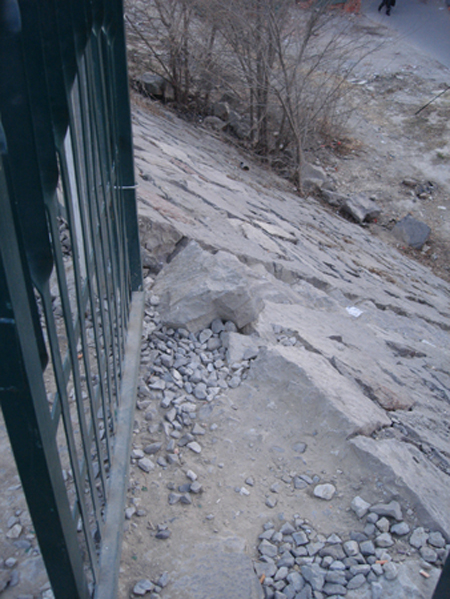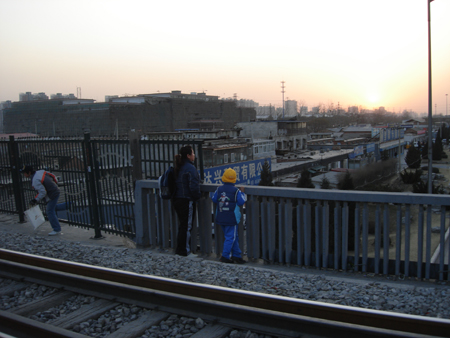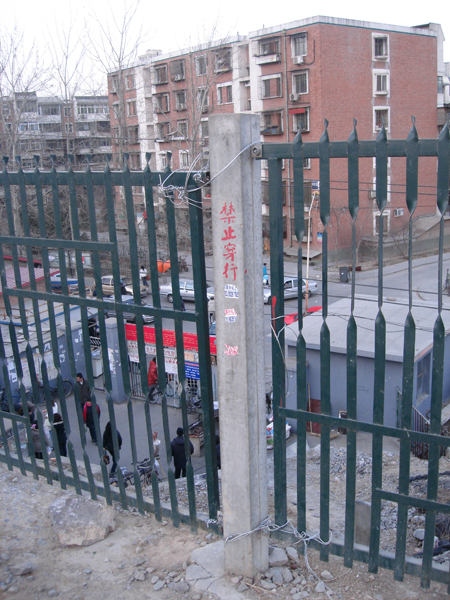
Before they built the pedestrian walkway the railway bridge served well to cross the highway and is still favored by many despite it being “closed off”.
I love living in China. Especially Beijing. Many of the basic precepts evinced by the local people, at an instinctual level, are in near perfect alignment with my own, in oft profound ways, especially at a deep philosophical level, but also evidenced in every day life. The longer I live here, the more similar in thought, and increasingly in deed, I become to my fellow Beijingren, to a point that, upon reflection, astounds me, as I am admittedly more wont to dwell on the differences.
A case in point is traffic, particularly pedestrian traffic, which I’ve discussed previously, in, “Wading through traffic“, even turning it into a magazine article, and then going so far as to write a follow up article for the next issue. In both articles, I examine the front where motor-driven and pedestrian traffic collide, and how once rushing forward, it is very difficult to stem the flow of pedestrians, and how tension arises out of the utter lack of respect afforded the pedestrian from most motor vehicle drivers, the exact degree of contempt held a measure of the perceived status of vehicle employed, ranging from mianbaoche to Bentleys.
The topic of Beijing traffic utterly fascinates me, as I love exploring human dynamics, and often use the qi flow dynamics model from Chinese martial and healing arts, particularly qi gong, as a frame of reference, yet also like to employ physical models in my description. I observe that for the most part a collective of Chinese pedestrians can be expected to behave as water.
A single drop of water, placed by fortune in a most inopportune time or position, can exact all manner of mishap upon its surroundings. So, too, the actions of a lone pedestrian can lead to disastrous consequences. However, the flow of the whole of pedestrian traffic lies on a deep resounding sine wave, far beneath the erratic waveforms of individuals, and is far more pleasant to plug into. The streets of Beijing bestow ample opportunity for exploration and observation. However, upon occasion, I, like many of my fellow Beijing pedestrian friends, prefer to travel off the beaten path, whenever possible, provided I arrive expeditiously at my destination.

The stone stairs can be daunting, yet are regularly used by children.
One of may favorite off-road paths is along the train tracks near my house. The bridges cross over major arteries of the city, as well as streams, rivers, and even a lake! OK, lake may be stretching it, but there is a reservoir near my house, readily accessible from the tracks near the subway station. The carved stone steps are surprisingly steep and narrow, which can be daunting for the uninitiated. Yet, they lead right up to a wonderful walking path right along the tracks. Or, rather, they used to, until someone got the bright idea to block it off and keep out all of the pedestrians.
If you dam up water the expected result is backflow, and if you have a means of managing or containing this backflow, all is well and nice. If you haven’t, however, there is a good chance you may find the integrity of your dam is challenged. So it is with Chinese pedestrians.

An enterprising individual created a small gap in the fence to allow access to the tracks.
Some of my best walks last summer were along these train tracks, so I reacted with dismay upon this development, but was spared a lengthy curb on this pastime, as the free will and spirit of Chinese pedestrians would soon prevail! The construction of the barrier fence had been viewed with interest and loathing by the track walkers, discernible from the contemptuous indifference with which they viewed the assorted building materials strewn all around the impromptu construction site which the entrance way to the tracks had become. No sooner, however, had this offending fence gone up then a hero arose! A small hole, just large enough for the truly sprite to take advantage of, yet a gaping chasm in the battle of wills between we who walk the tracks, and those who would prevent us. The next hero was far less subtle, preferring to simply unhinge part of the wall and leave a one meter wide gap as an entrance way.

Another enterprising individual displayed less finesse by forcing the fence open at a vulnerable midpoint union.
What happens next is one of the things I love most about living here. A worker group is dispatched to resolve the issue, armed with spools of flexible wire, which they employ to restore the fence to it solid and imposing former state, and fortify it against further breaches. Which, is to say, they do nothing at all, as though such bandaid-like attempts to fix the fence could be seen as an indication that the authorities which dispatched the work team are passively endorsing the ensuing stream of pedestrian traffic that quickly picks up where it left off, with minor allowances for the new conditions. Beijing offers plentiful case studies of these manner of displays of human resourcefulness.

Occasionally, the authorities respond by sending out a task force to deal with the situation .
I realize that there are those out there that will state that a law is a law, and to break any law, is to make one a law-breaker. To those I retort, a law is a law only in as it is understood and accepted by those who empower said law, be they those that create the law, or those whom empower the law through consensus to obey it. The Beijing city government, and, indeed, any government, is free to follow its directives and to achieve the peace in a manner of its own accordance, as laid down by the statutes of its structure, which is to say, they can pretty much enforce any law they so choose. And they are definitely turning a blind eye to the situation on the tracks. Keeping people from walking up there is obviously not that high on the list of priorities, especially with the encroaching Beijing Olympics.
Until someone gets run over by a train.











